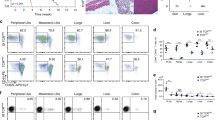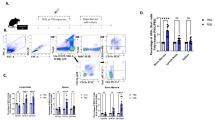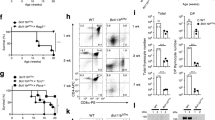Abstract
LACK of functional expression of CD40 ligand (CD40L) on T cells results in hyper-IgM syndrome (HIGMl), a human immunodeficiency associated with a severely impaired humoral immune response that is consistent with defects in B-cell responses1–3. Patients also succumb to recurrent opportunistic infections such as Pneumocystis carinii and Cryptosporidial diarrhoea4,5, suggesting that T-cell functions are also compromised in these individuals, but so far this has not been explained. We have previously shown that mice deficient for CD40L, like HIGMl patients, show grossly abnormal humoral responses6. Here we report that CD40L-deficient mice are defective in antigen-specific T-cell responses. Adoptively transferred antigen-specific CD4+ T cells lacking CD40L failed to expand upon antigen challenge of the recipients, showing that expression of CD40L on T cells is required for in vivo priming of CD4+ T cells and therefore for the initiation of specific T-cell immune responses.
This is a preview of subscription content, access via your institution
Access options
Subscribe to this journal
Receive 51 print issues and online access
$199.00 per year
only $3.90 per issue
Buy this article
- Purchase on Springer Link
- Instant access to full article PDF
Prices may be subject to local taxes which are calculated during checkout
Similar content being viewed by others
References
Kroczek, R. A. et al. Immun. Rev. 138, 39–59 (1994).
Allen, R. C. et al. Science 259, 990–993 (1993).
DiSanto, J. P., Bonnefoy, J. Y., Gauchat, J. F., Fischer, A. & de Saint Basile, G. Nature 361, 541–543 (1993).
Callard, R. E., Armitage, R. J., Fanslow, W. C. & Spriggs, M. K. Immun. Today 14, 559–564 (1993).
Notarangelo, L. D., Duse, M. & Ugazio, A. G. Immunodef. Rev. 3, 101–121 (1992).
Xu, J. et al. Immunity 1, 423–431 (1994).
Kearney, E. R., Pape, K. A., Loh, D. Y. & Jenkins, M. K. Immunity 1, 327–339 (1994).
Kennedy, M. K. et al. Eur. J. Immun. 24, 116–123 (1994).
Foy, M. et al. Eur. J. Immun. 25, 596–603 (1995).
Ranheim, E. A. & Kipps, T. J. J. exp. Med. 177, 925–935 (1993).
Wu, Y. et al. Curr. Biol. 5, 1303–1311 (1995).
Epstein, M. M., Rosa, F. D., Jankovic, D., Sher, A. & Matzinger, P. J. Exp. Med. 182, 915,–922 (1995).
Constant, S. et al. J. Immun. 154, 4915–4923 (1995).
Moudgil, K. D. & Sercarz, E. E. J. exp. Med. 178, 2131–2138 (1993).
Kamogawa, Y., Minasi, L. A., Carding, S. R., Bottomly, K. & Flavell, R. A. Cell 75, 985–995 (1993).
Strasser, A., Harris, A. W., Jacks, T. & Cory, S. Cell 79, 329–339 (1994).
Author information
Authors and Affiliations
Rights and permissions
About this article
Cite this article
Grewal, I., Xu, J. & Flavell, R. Impairment of antigen-specific T-cell priming in mice lacking CD40 ligand. Nature 378, 617–620 (1995). https://doi.org/10.1038/378617a0
Received:
Accepted:
Issue Date:
DOI: https://doi.org/10.1038/378617a0
This article is cited by
-
Reversal of the T cell immune system reveals the molecular basis for T cell lineage fate determination in the thymus
Nature Immunology (2022)
-
Infectious Complications Predict Premature CD8+ T-cell Senescence in CD40 Ligand-Deficient Patients
Journal of Clinical Immunology (2021)
-
Engineering better chimeric antigen receptor T cells
Experimental Hematology & Oncology (2020)
-
Protein kinase 2 (CK2) controls CD4+ T cell effector function in the pathogenesis of colitis
Mucosal Immunology (2020)
-
Expression, purification and biological characterization of the extracellular domain of CD40 from Pichia pastoris
BMC Biotechnology (2016)
Comments
By submitting a comment you agree to abide by our Terms and Community Guidelines. If you find something abusive or that does not comply with our terms or guidelines please flag it as inappropriate.



